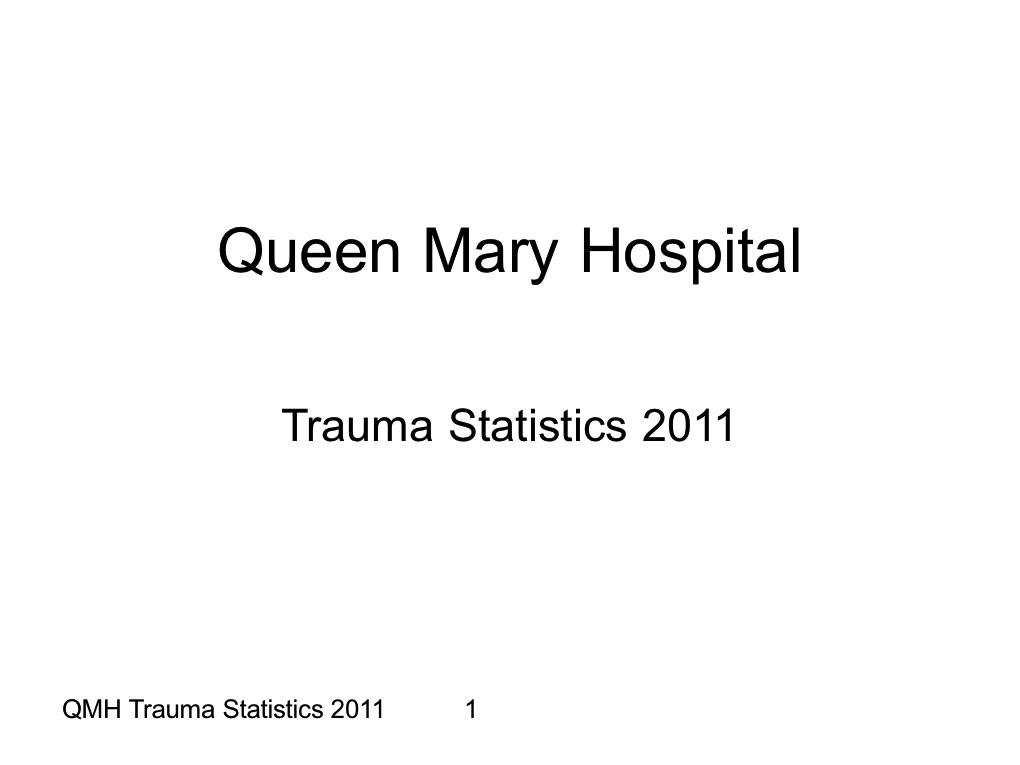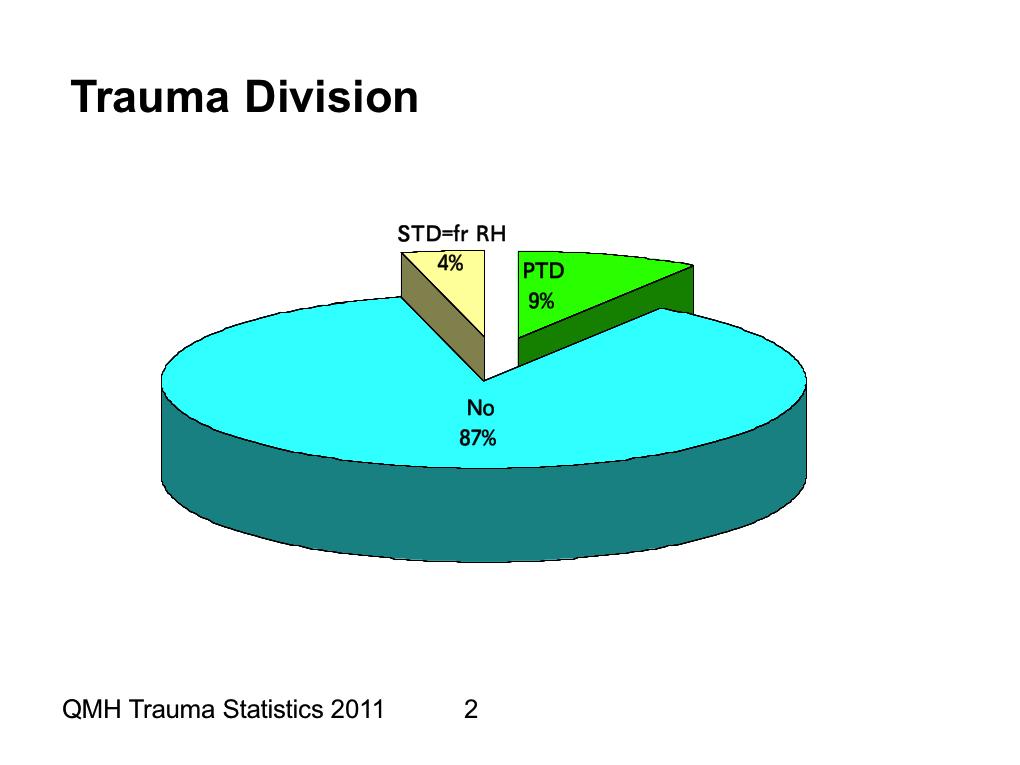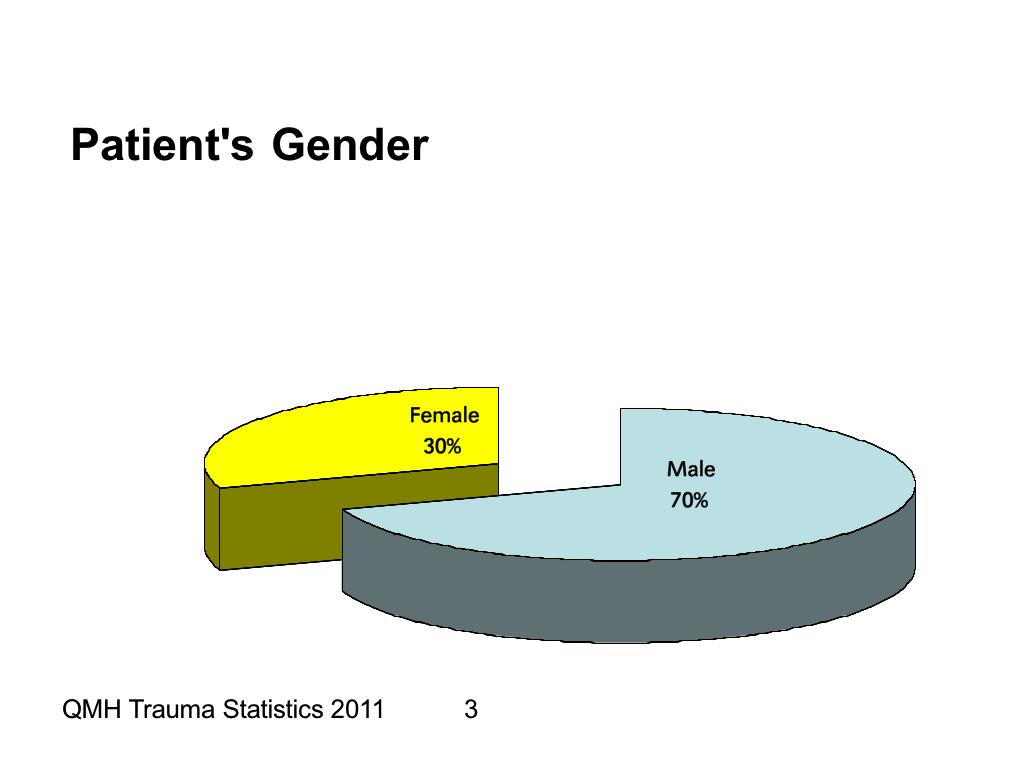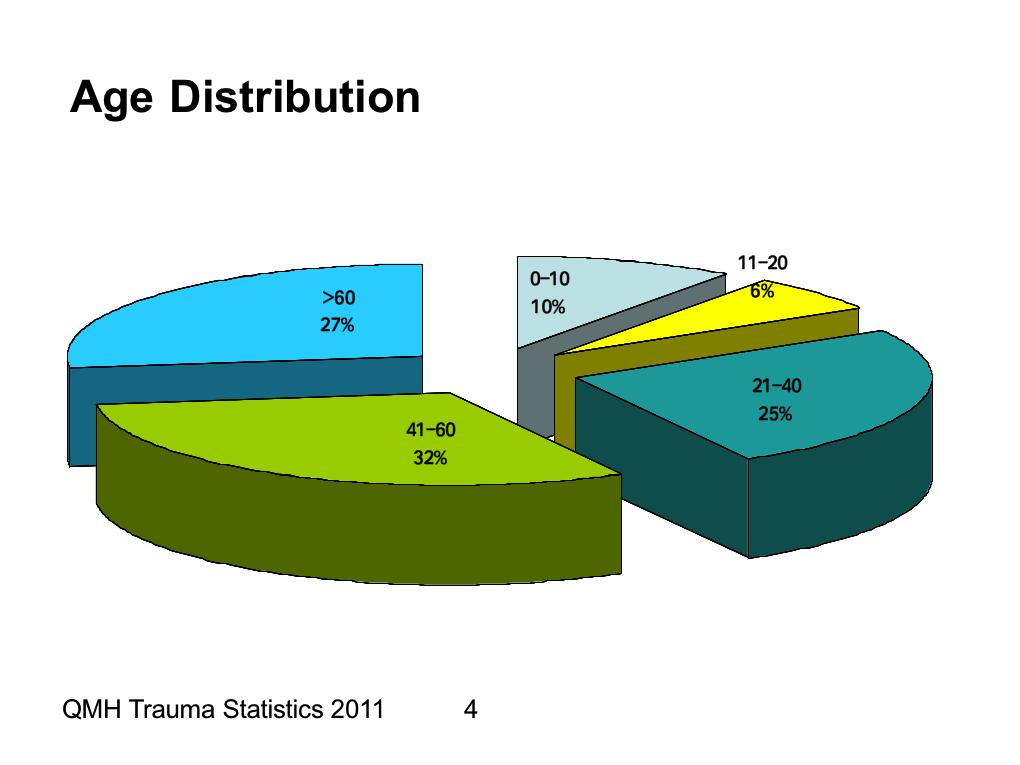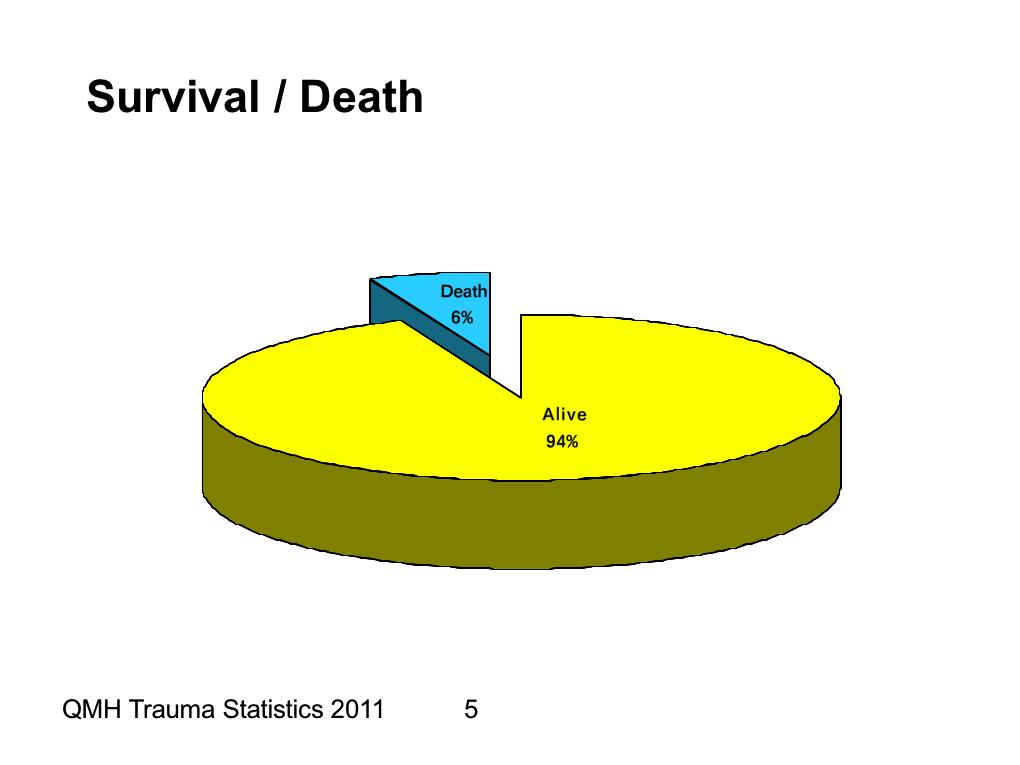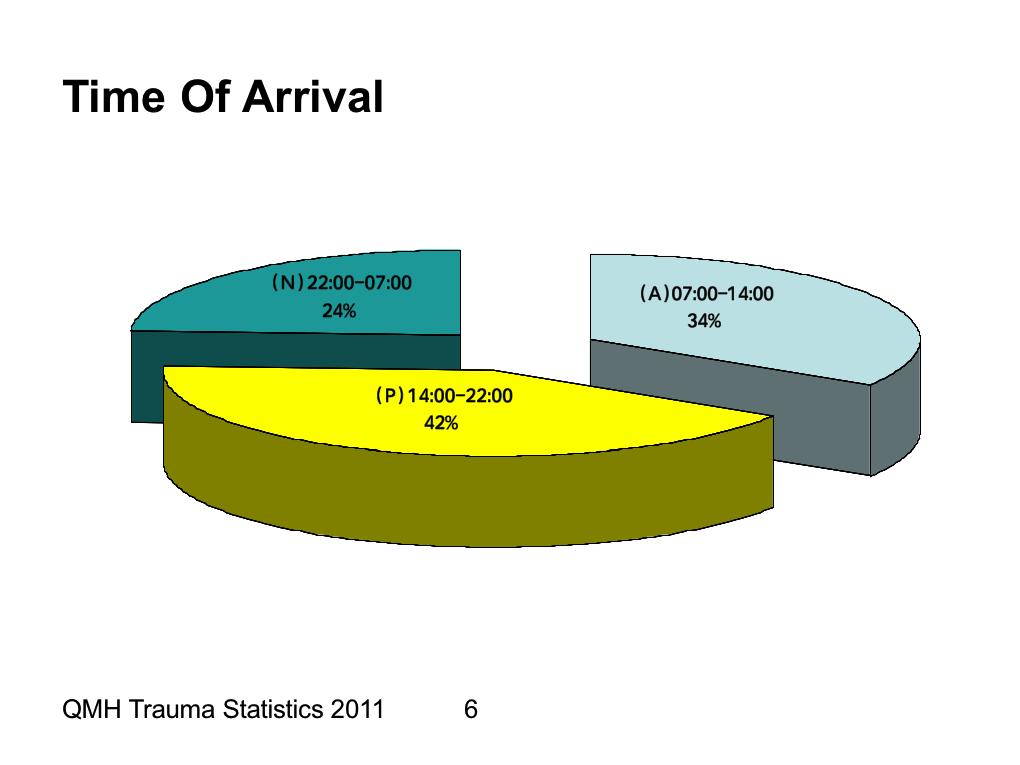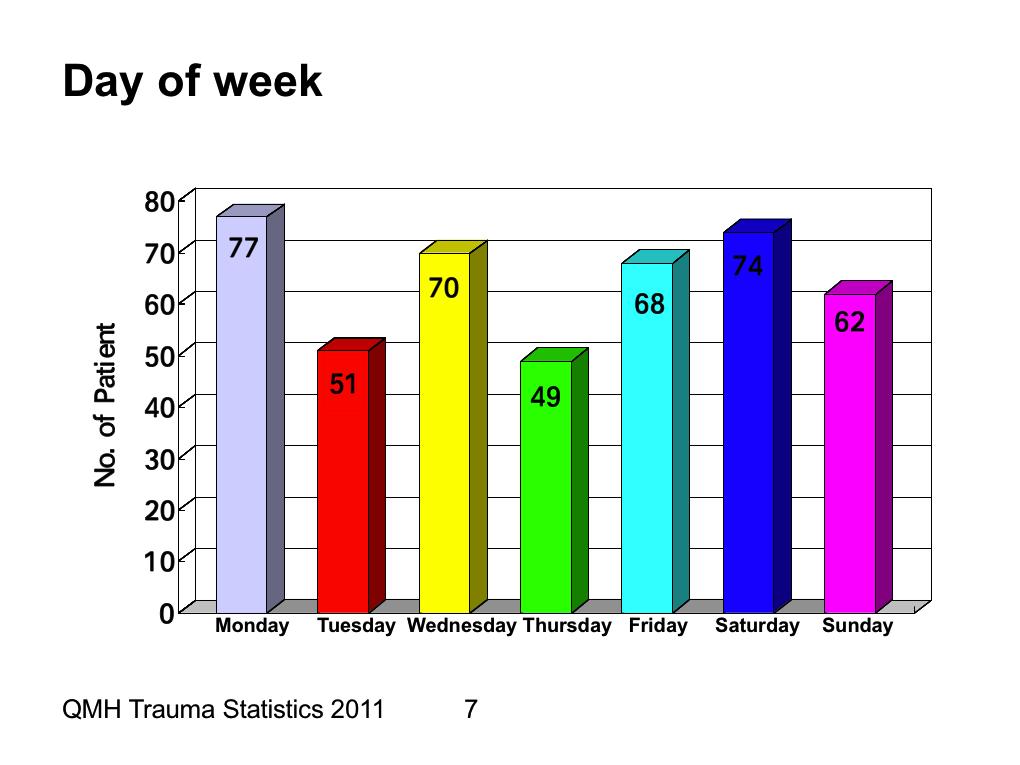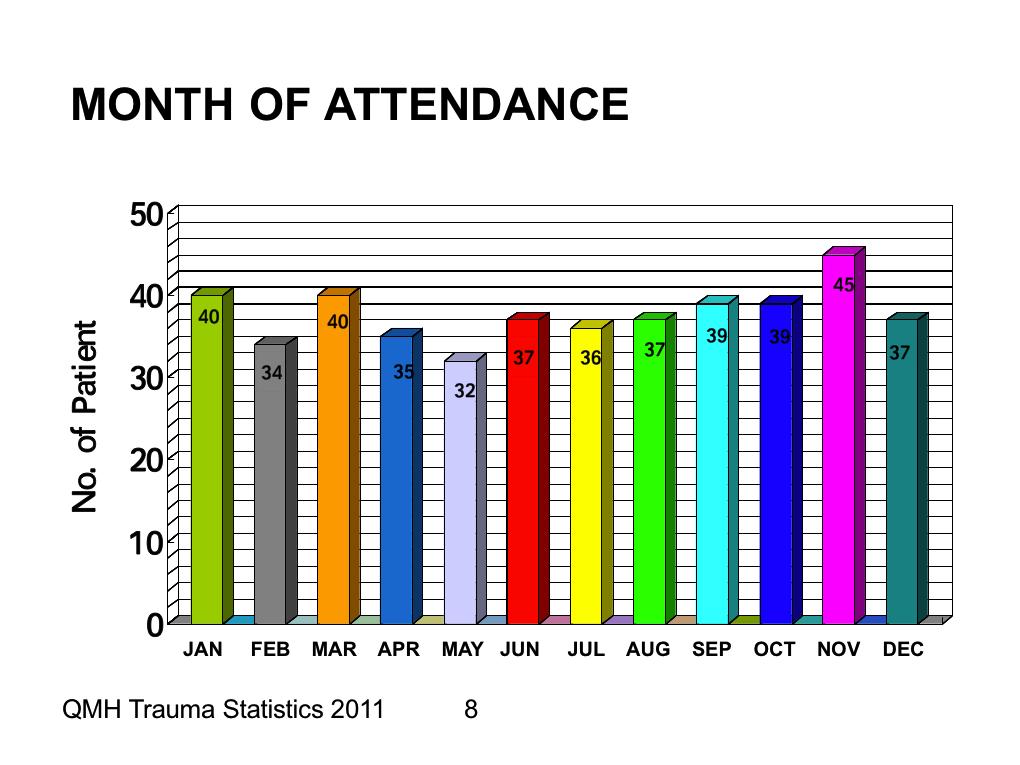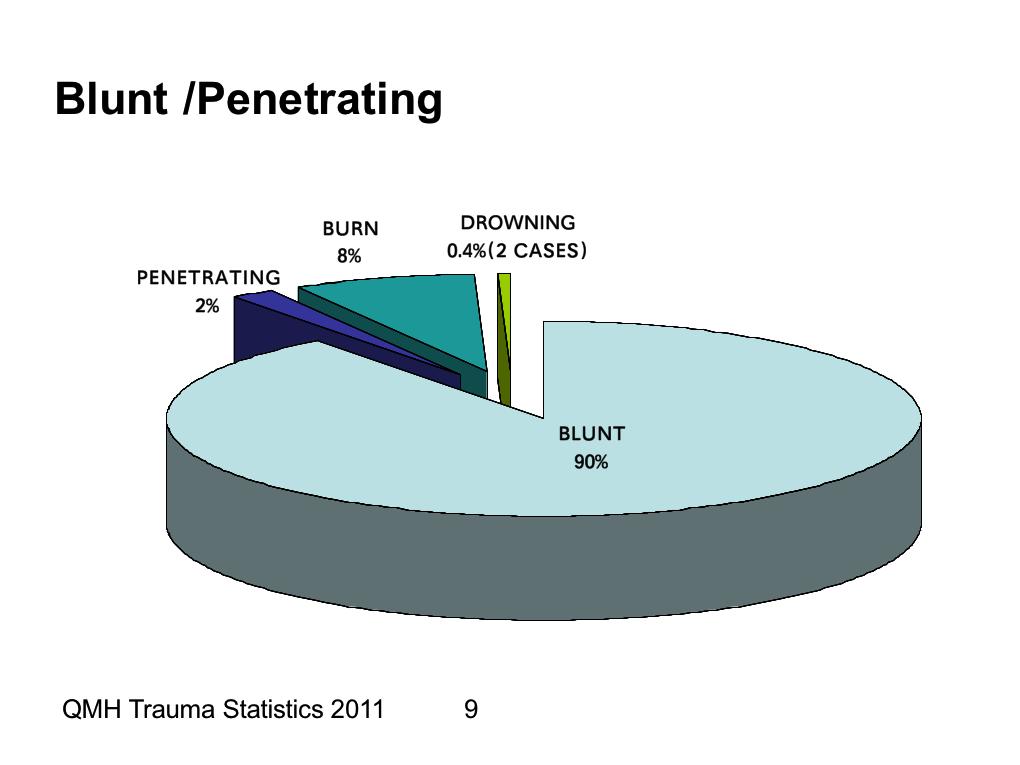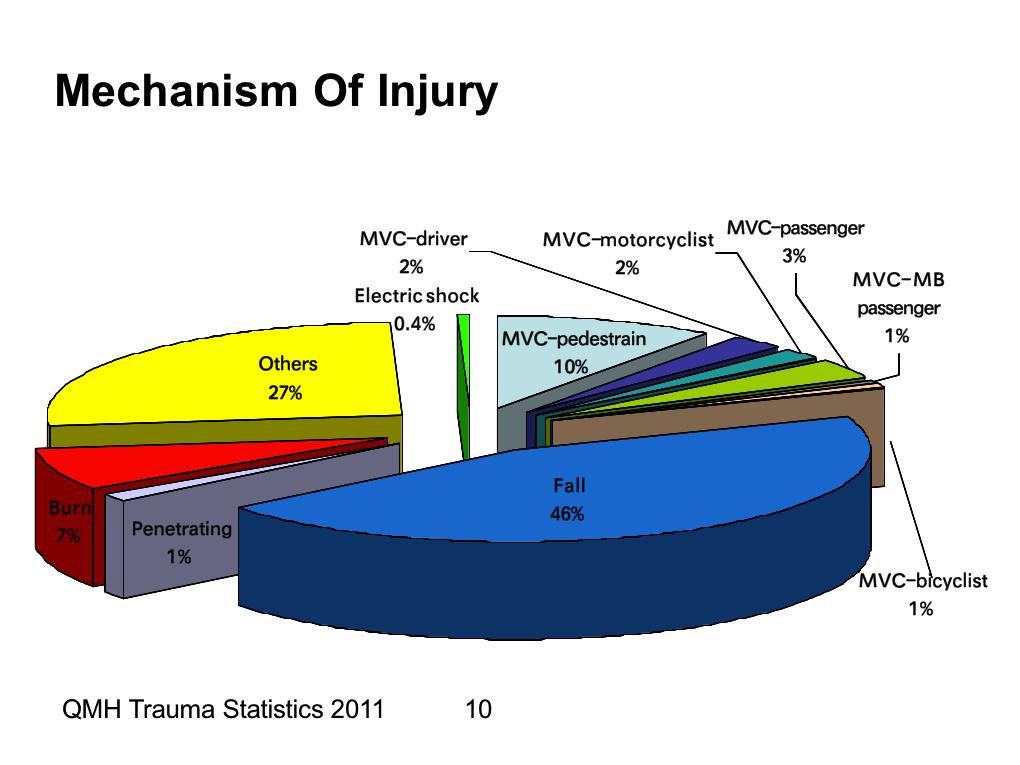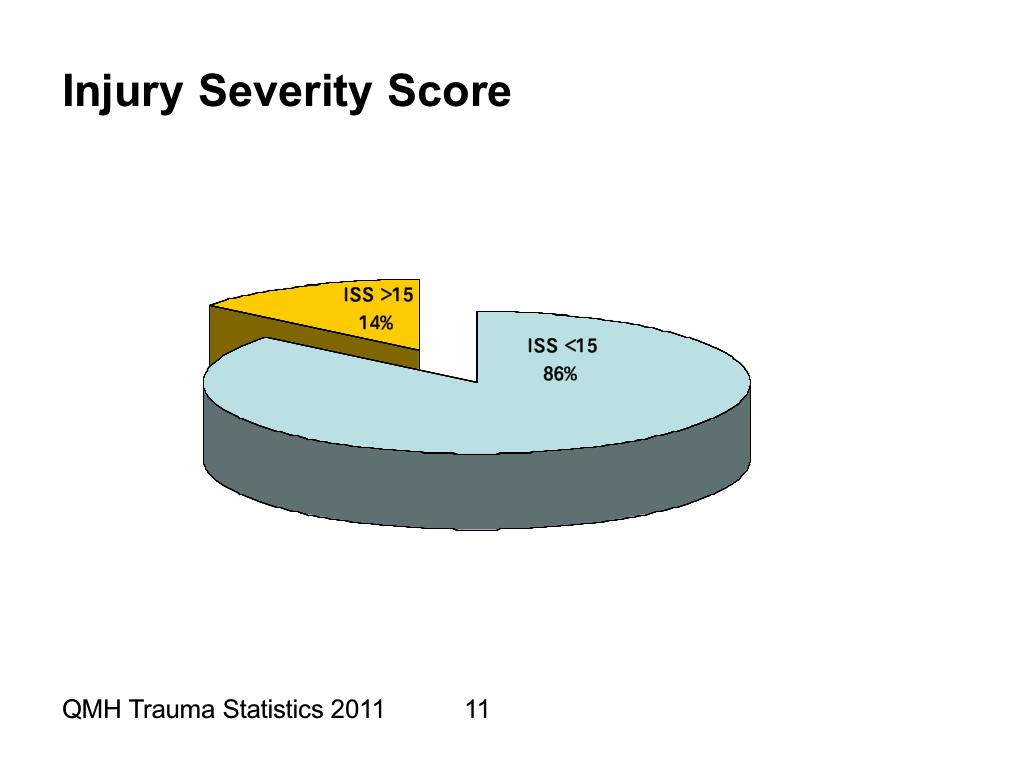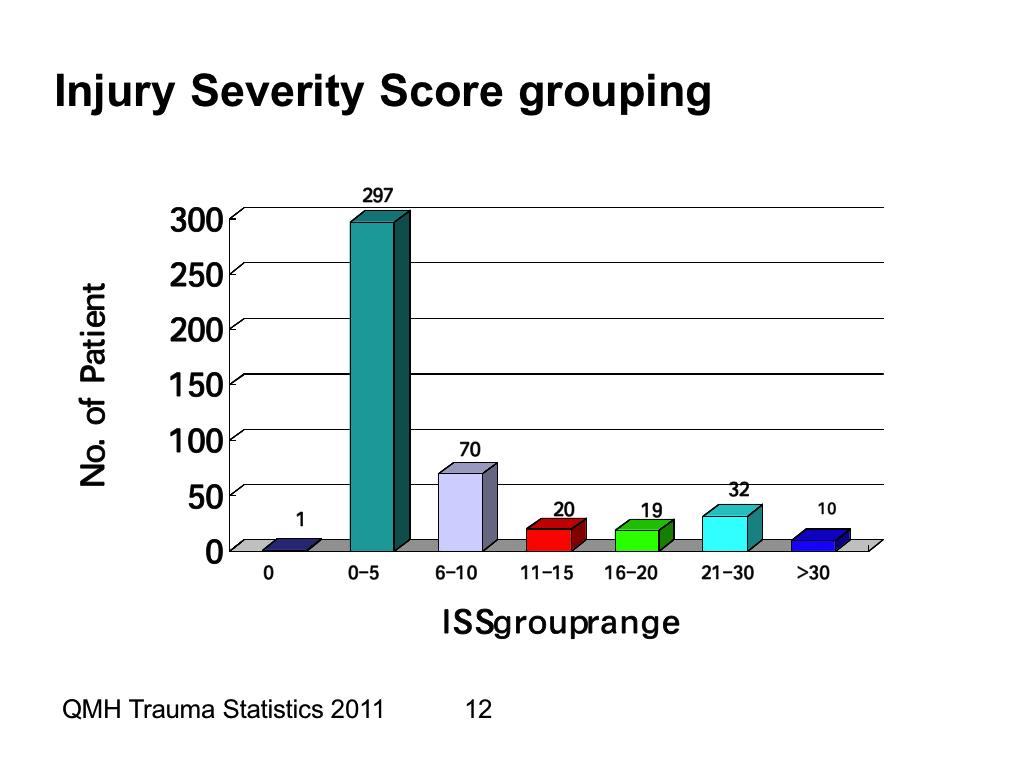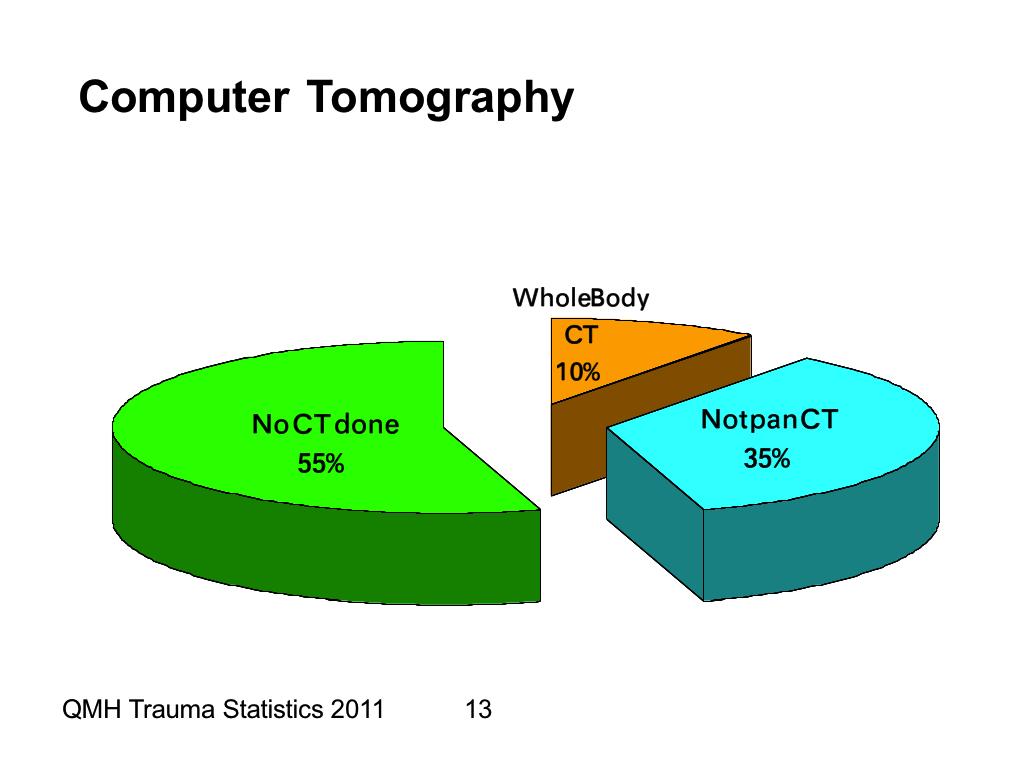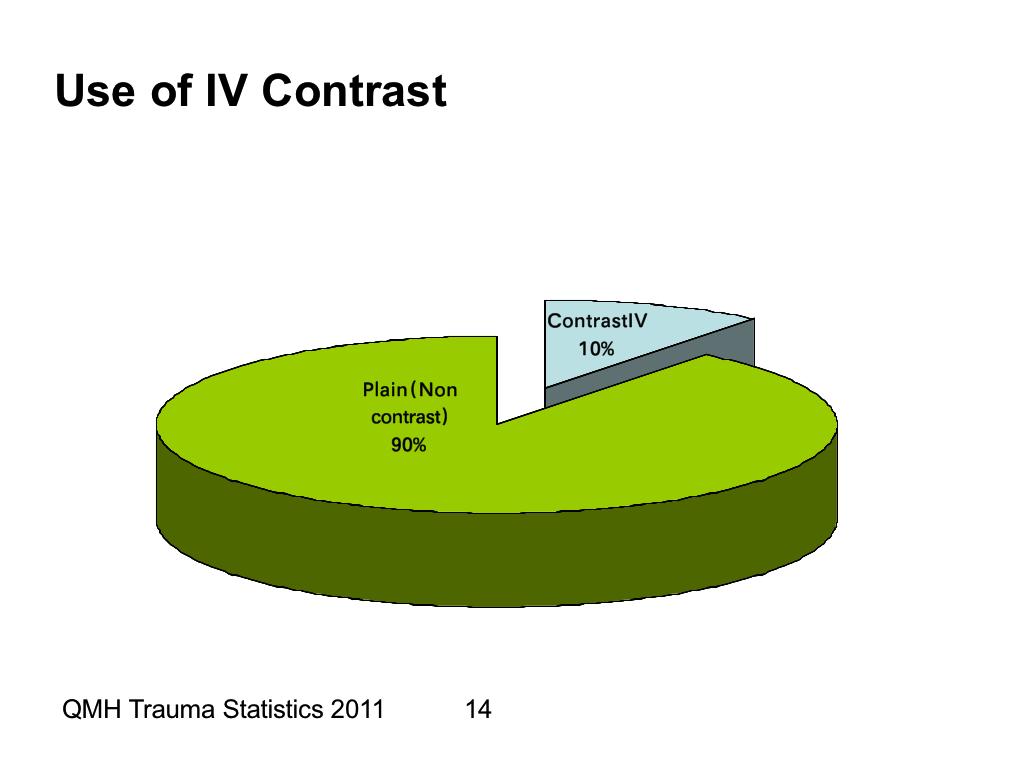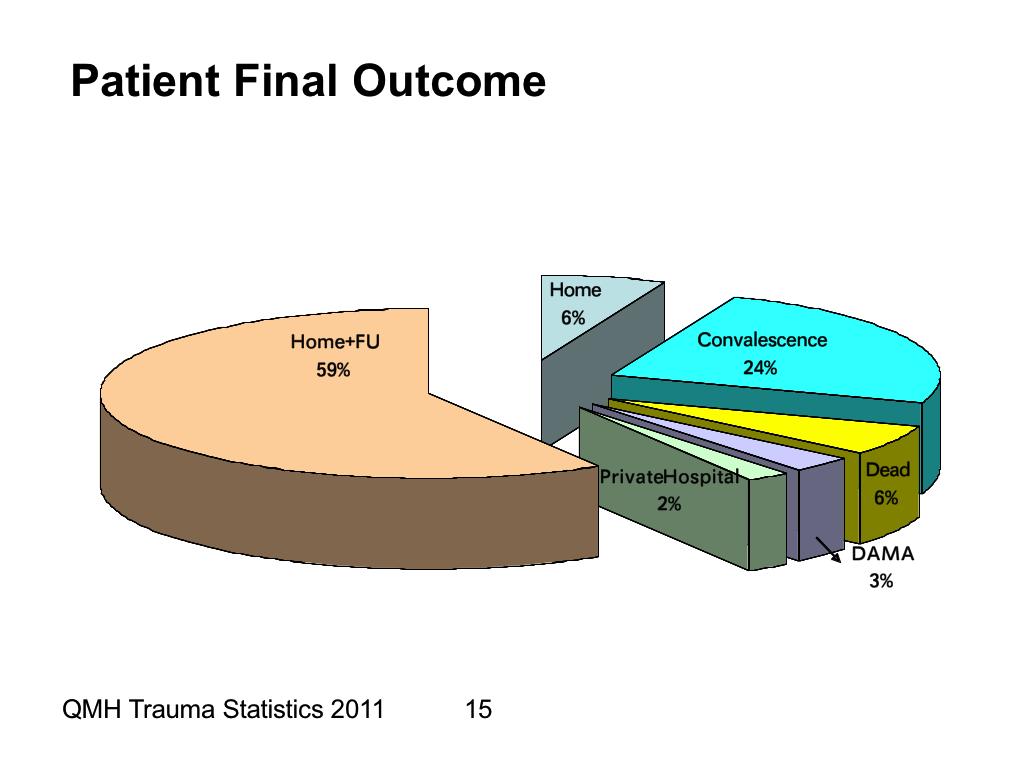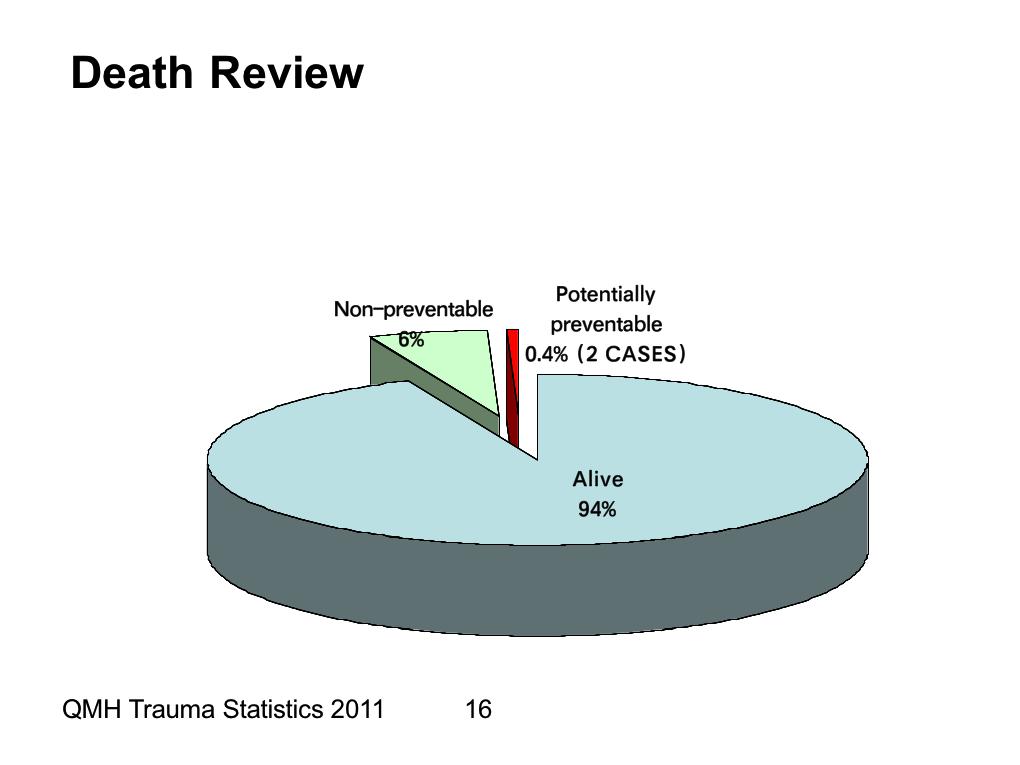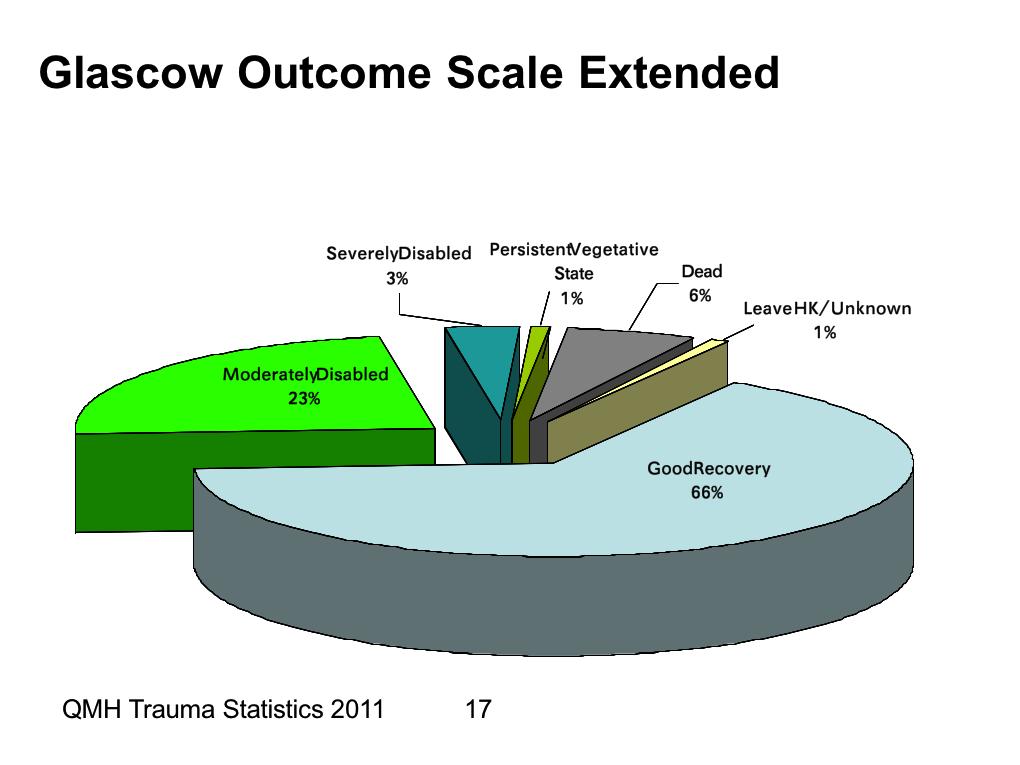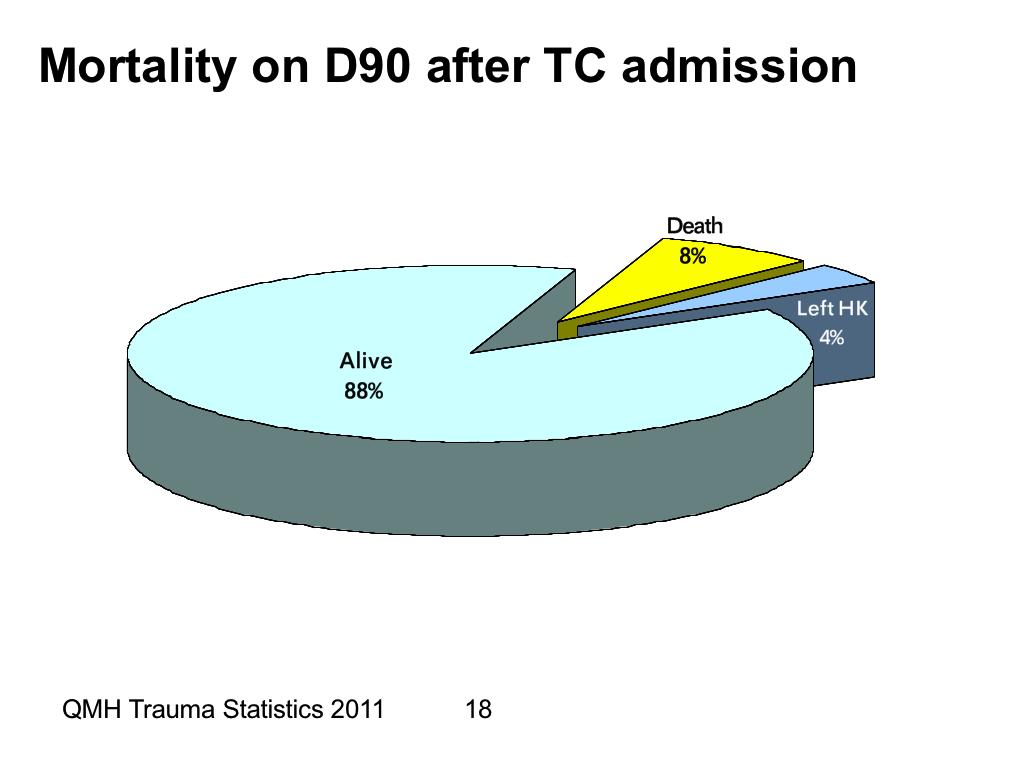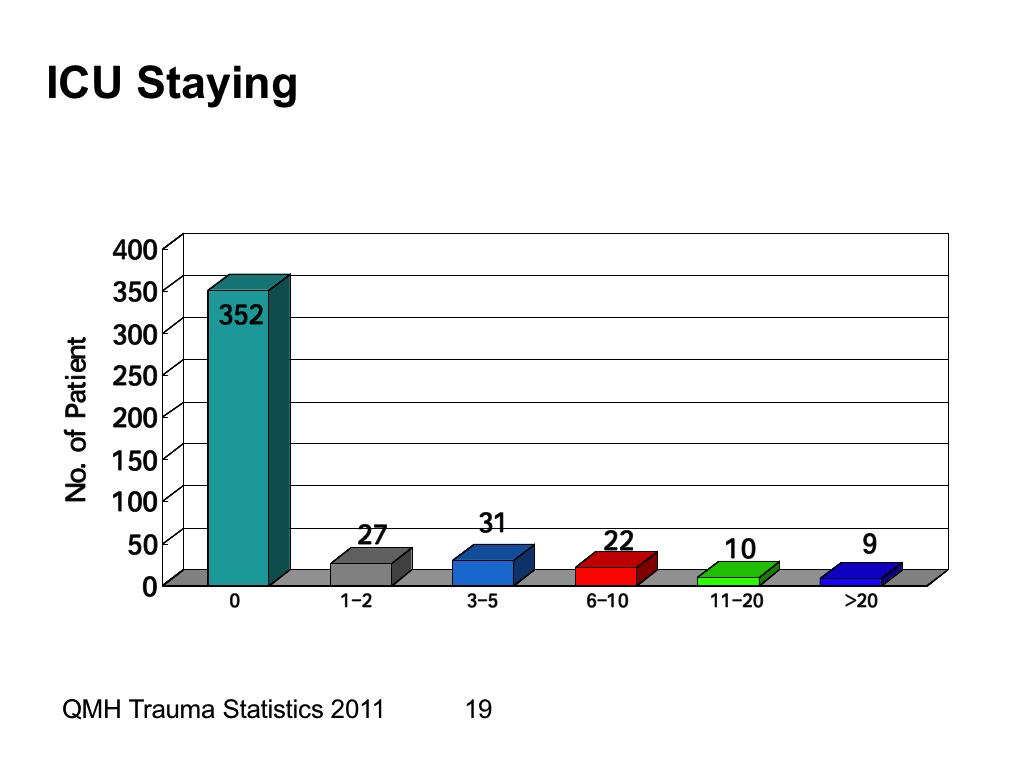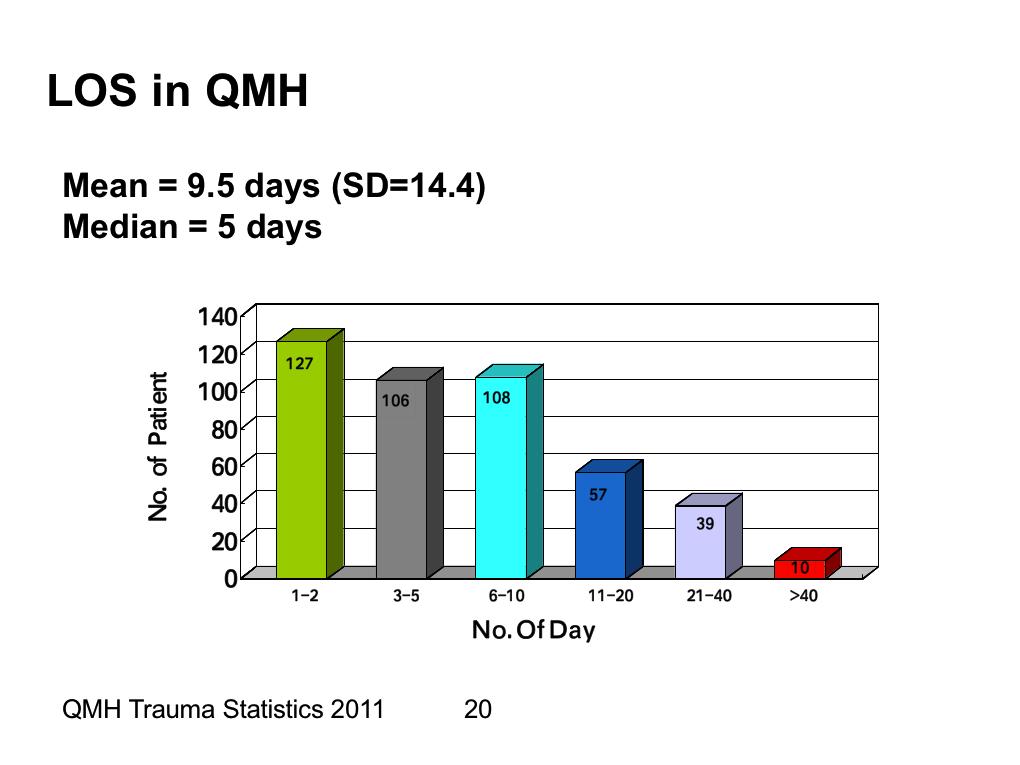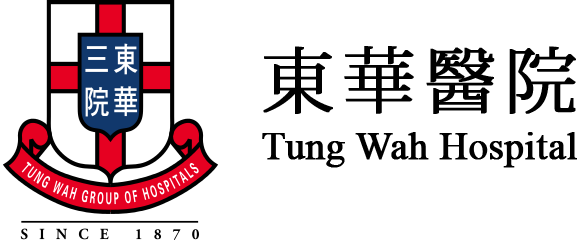Trauma Service
The Trauma Service was formally established in Queen Mary Hospital (QMH) in August 1997. The objectives of this central service are:
1. To coordinate clinical and support departments in the delivery of trauma service;
2. To identify problems and issues of common concern in trauma, and;
3. To review, coordinate and develop guidelines, protocols and quality assurance programmes related to trauma care.
Development of Trauma Service in Queen Mary Hospital
| Date | Events |
|---|---|
| Jan 1995 | First interdepartmental meeting on Trauma Organization and Service |
| Sep 1996 | First joint trauma audit meeting of Departments of A&E and Surgery |
| Jan 1997 | Inaugural course of Advanced Trauma Life Support (ATLS) for doctors Hong Kong Surgical Forum – Trauma Care |
| Apr 1997 | Inaugural course of Advanced Burn Life Support (ABLS) |
| Apr-Jun 1997 | Pilot study on early management of trauma patients by Department of Surgery |
| Jul 1997 | Formation of Trauma Centre Committee |
| Aug 1997 | First meeting of QMH Trauma Centre Committee |
| Sep 1997 | Creation of the post of Trauma Director First Trauma Service Executive Committee Meeting (TSEC meeting) |
| Oct 1997 | First interdepartmental trauma audit meeting |
| Jan 1998 | Creation of the post of Trauma Nurse Coordinator Development of trauma registry |
| May 1998 | Establishment of Trauma Team Activation Criteria |
| Apr 2003 | Holding regular meetings with other 5 trauma centres with presentation of combined data |
| Apr 2005 | Commencement of Trauma Diversion Scheme in Hong Kong West Cluster |
| May 2006 | Establishment of "TBI" calling system for managing patients with traumatic brain injury Second trauma guideline for QMH - ”Guide to Trauma Service” |
| Sep 2008 | First FAST course - Introduction to FAST scan guideline for non-radiologist |
| Mar 2009 | Inter-hospital peer review with Prince of Wales Hospital |
| Aug 2009 | First Advanced Trauma Care Workshop |
| Jul 2010 | Third trauma guideline for QMH - “Guide to Trauma Care” |
| Sep 2010 | Joint Centered ISS Coding Audit Meeting |
| Oct 2010 | Trauma Resuscitation Progress Form (2nd version) in use |
| Jan 2011 | Setup of Guideline for “Whole Body Computerized Tomography (for adult patient)” |
| 2011 | Trauma Transfusion Protocol Transamine Protocol |
| 2013 | First Multi-centered Review Meeting (all 5 TCs in Hong Kong) |
| 2014 | Prothrombin complex concentrate protocol Airway Management Flowchart and set up of airway trolley |
| 2016 | Consultant (Trauma Service) in post PCC protocol Ver 2.0 + Debagatrin antibody |
| 2018 | Prothrombin complex concentrate (PCC) therapy for warfarin / new oral anticoagulants (NOAC) associated life-threatening bleeding in A&E, Ver 3.0 (Beriplex®) + Debagatrin antibody Trauma Mobile website in use via mobile phone |
| 2019 | Nurse Consultant (Trauma) in post |
| Dec 2019 | CRM simulation training co-organized with Q&S Team of Hong Kong West Cluster |
| Mar 2023 |
Associate Nurse Consultant (Trauma Service) in post |
|
|
Trauma Calling System in Queen Mary Hospital

Trauma Service Executive Committee (TSEC)
With representatives from various clinical departments, the TSEC meets quarterly and directs quality improvements in the following ways:
- Oversee and direct the development of trauma service in QMH.
- Implementation of related guidelines and policies.
- Review and address issues relating to structure, process and outcome for quality improvement.
Members and Co-opt Members : Representatives from Clinical Departments
| Dr. Wing-Chiu DAI | Consultant, Director of Trauma Service Department of Surgery (Chairman) |
| Dr. Theresa LI | Cluster Chief Executive Hong Kong West Cluster |
| Dr. Tat-Chi TSANG | Chief of Service Department of Accident & Emergency |
| Dr. Andy NG | Associate Consultant Department of Anesthesiology |
| Dr. Alfred WONG | Consultant Department of Intensive Care Unit (Adult) |
| Dr. Lai-Fung LI | Consultant Department of Neurosurgery |
| Dr. Colin YUNG | Associate Consultant Department of Orthopaedics & Traumatology |
| Dr. Kelvin CHOI | Consultant Department of Radiology |
| Dr. Carolette GROENEWALD | Associate Consultant Department of Surgery |
| Ms. Celestine NG | Associate Nurse Consultant Trauma Service |
Trauma Registry
It is a systematic collection of data from medical and nursing records of major trauma cases attended and/or admitted to QMH. It consists more than 300 items relating to demographic, assessment, resuscitation, outcome/ complications and follow up. Data collection is done by the Trauma Nurse Coordinator.
Interdepartmental Trauma Audit Meeting: Bi-monthly
It is a multi-disciplinary case review meeting for quality improvement, experience sharing and staff education.
Chairman: A representative from Clinical Department of A&E, Surgery, Anaesthesiology, Orthopaedics, ICU or Neurosurgery.
Participants: Medical and nursing staff from concerned clinical departments in QMH and other hospitals.
Organizing: Representatives from Departments of A&E, Surgery, Diagnostic Radiology and Trauma Nurse Coordinator.
- Statistical report
- Case review and discussion
- recommendation for quality improvement
Training and Development
- Support trauma team members to attend ATLS, ATCN, TCAR
- Arrange Crew Resource Management Simlations training co-organized with Q&S team of HKWC
Trauma Service Audit
With the aim to improve quality, trauma service auditing is a systematic critical analysis of the quality of care through setting agreed standards, measuring performance concurrently or retrospectively, comparing performance with standards, identifying the need for improvement and implementing changes.
Currently, some clinical audit activities are in progress, they include:
- Appropriateness of trauma team activation
- Trauma team response time > 15 minutes
- Delayed diagnosis (delay in diagnosis for non-musculoskeletal injuries > 24 hours after arrival)
- Delayed operations (delay in major operations: craniotomy, exploratory thoracotomy, laparotomy > 4 hours after admission)
- Confidential peer review of problematic cases
- Trauma deaths
- Trauma record documentation
- Staying time in A&E Dept. > 2 hours
QMH Trauma Centre involved Study
| Year | Topic | Publication / Presentation |
|---|---|---|
| 2007 | Early reports from the five trauma centres in Hong Kong | HA convention 2007 |
| 2008 | Injury Severity Score (ISS) vs. ICD-derived Injury Severity Score (ICISS) in a patient populateion treated in a designated Hong Kong trauma centre | McGill Journal of Medicine [Vol. 11(1) 2008] |
| 2008 | Trauma-related accidents on Hong Kong Island | MVC symposium Nov 2008 |
| 2009 | Pedestrian Injuries in an ageing society: Insights from hospital trauma registry | The Journal of TRAUMA Injury, Infection, and Critical Care [Apr 2009] |
| 2009 | Return-to-work as an outcome measure of trauma service --- a single-centre pilot study | Final write-up |
| 2010 | Outcome of severely injured trauma patients at a designated trauma centre in the HKSAR | Chinese Medical Journal [2010;123(10):1251-54] |
| 2010 | The first five years since trauma centre designation in Hong Kong | Singapore Trauma Symposium 2010 |
| 2010 | Joint study in Trauma data Hong Kong vs. Singapore | Data analyzing |
| 2010 | Outcome after operative intervention for traumatic brain injuries elderly |
Asian Journal of Neurosurgery |
| 2011 | View Annual Report | --- |
| 2011 | Impact of a multidisciplinary trauma team on the outcome of acute subdural haematoma | Injury, Int.J.Care Injured 43(2012)1419-1422 |
| 2012 | The Diagnostic Accuracy of Focused Abdominal Sonography for Trauma in blunt abdominal trauma patients in a local trauma center of Hong Kong | Chinese Journal of Traumatology 2012;15 |
| 2013 | Implementation process of a Trauma Transfusion Protocol in a trauma centre in Hong Kong | Poster presentation in Society of Trauma Nurse Conference, USA, 2013 |
| 2013 | More than a ratio: A review of Trauma Transfusion Protocol in Queen Mary Hospital | Poster presentation in HA convention 2013 |
| 2014 | Management of liver trauma:10-year experience in a trauma centre | Poster presentation in Singapore Trauma Conference 2014 |
| 2014 | Diagnostic accuracy of Focused Abdominal Sonography for Trauma in blunt abdominal trauma patients in a trauma centre of Hong Kong | Poster presentation in Singapore Trauma Conference 2014 |
| 2014 | Secondary trauma diversion: what are the reasons? | Poster presentation in Singapore Trauma Conference 2014 |
| 2014 | HMRF study - Measuring the Hong Kong Population Burden of Injuries | --- |
| 2014 | TMH Massive Transfusion Protocol | --- |
| 2014 | Epidemiology of paediatric trauma in Hong Kong: A multicentre cohort study | Clinical Epidemiology and Global Health 7 (Mar. 2019) 71–78 |
| 2014 | Outcome after operative intervention for tramatic brain injuries in the elderly | Asian Journal of Neurosurgery, 2015 |
| 2015 | Review of casualties transported via private ambulance service to a local trauma centre in Hong Kong | Poster presentation in Singapore Trauma Conference 2015 |
| 2016 | Three-in-one protocol reduces mortality of patients with haemodynamically unstable pelvic fractures—a five year multi-centred review in Hong Kong | International Orthopaedics; Feb. 2018 |
| 2017 | A Comparison of Major Trauma Care in Hong Kong and Germany |
European Journal of Trauma and Emergency Surgery Published on line: 3.3.2020 https://doi.org/10.1007/s00068-020-01311-6 |
| 2019 | RISC II is superior to TRISS in predicting 30-day mortality blunt major trauma patients in Hong Kong |
European Journal of Trauma and Emergency Surgery https://doi.org/10.1007/s00068-021-01667-3 |
| 2022 | Epidemiology and change in pattern of traumatic injuries in children visiting emergency departments during COVID era in Hong Kong: A retrospective single-institutional serial cross-sectional study | Poster presentation in the 9th Congress of the European Academy of Paediatric Societies on 7-11 Oct 2022 |
| 2024 |
Implementation of an Institutional CT Head Decision Rule to Reduce Radiation Exposure in Paediatric Neurotrauma |
Resident and Fellow Trauma Paper Competition organized by the American College of Surgeons Committee on Trauma - Region 16 winner: Dr. Sum Hiu Fung Christopher |





